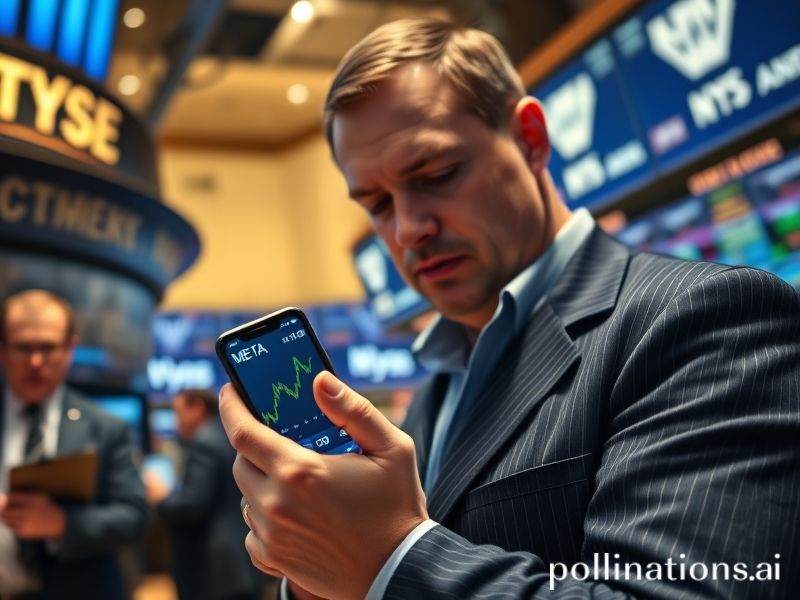Meta Stock: The Global Rosary Bead We All Swipe On
The planet’s lingua franca is no longer English; it is the green and red candlestick. From Lagos cafés where traders watch Meta stock on cracked Android screens to glass towers in Singapore humming with algorithmic prayers, the ticker META has become a planetary rosary bead. Swipe up, recite the revenue, murmur about Reality Labs losses, cross yourself against regulatory risk. The world now prays in quarterly guidance.
Facebook—sorry, Meta—has always been good at rebranding sins. Cambridge Analytica? Ancient history; today we have “efficiency years.” A genocide-facilitating newsfeed? Look over here, shiny VR headsets! The stock price, like a well-trained Labradoodle, obediently sits, rolls over, and fetches new all-time highs whenever Mark Zuckerberg promises to shave another 5 % off the headcount. International observers note the ritual with the weary amusement of parents watching a toddler insist the invisible friend is real.
Zoom out and the picture darkens comically. In the EU, regulators sharpen their €7.5 billion scalpels, ready to carve out another chunk of “behavioral advertising” flesh. Meanwhile American senators tweet #BreakUpBigTech between fundraising Zoom calls hosted on, well, tech. In India, WhatsApp is the de facto civil service; in Brazil, it is the central bank. Meta is the landlord, the post office, and occasionally the arsonist of the global village. And the villagers keep buying shares, because where else can you get 20 % EBITDA margins and a side of moral vertigo?
Emerging markets have their own special relationship with the stock. Nigerian retail investors treat it as a hedge against the naira’s interpretive-dance routine. Korean day-traders, fueled by kimchi and leverage, scalp options like they’re sniping esports opponents. European pension funds—those sober Scandinavians who lecture us about sustainability—quietly overweight META because, shh, engagement still equals cash flow and nobody wants to explain to retirees why their monthly kroner ran away with a metaverse avatar.
Then there are the geopolitical knock-knock jokes. China bans Facebook but still exports the Oculus parts; American politicians thunder about data sovereignty while streaming the thunder on Facebook Live. The Taiwanese semiconductor industry keeps etching the chips that might one day render Taiwan’s own geography as a virtual island inside Horizon Worlds. Irony, like supply chains, is globalized.
And yet, every earnings call feels like a séance where analysts ask the ghosts of teen attention spans for guidance. “Are they still on Instagram Reels?” whisper the pilgrims. “Have they migrated to TikTok, or perhaps to that ancient ruin called Outside?” The answer arrives in the form of ad-impression numbers, and the world exhales. Civilization, it seems, will continue to be monetized one doom-scroll at a time.
What does it mean when a single company’s share price can twitch the net worth of Norwegian widows and Chilean pensioners alike? It means we have built a planetary casino where the house always wins, and the chips are our collective attention spans. The meta in Meta is not metaverse; it is metastasis—an uncontrollable spread of code and cash that colonizes every idle minute from Manila commuter trains to Milanese trattorias. We are all long, whether we own the stock or not.
So the next time you see a green spike on a trading screen somewhere in the middle of nowhere, remember: that pixelated hop is someone’s retirement, someone else’s reelection war chest, and yet another teenager’s self-esteem. It’s a small world after all—just under four gigabytes, updated every millisecond. And the price, my friend, is always right until it isn’t. Until then, do like the pros: keep calm, carry on, and don’t forget to smash that like button. The algorithm is listening, and the market is always open.







